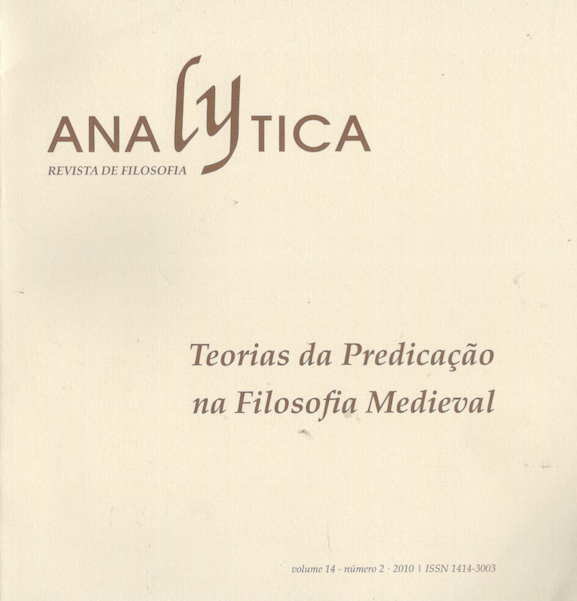Uma teoria dos signos e das afecções: Guilherme de Ockham e os fundamentos da crítica à teoria das species
Resumo
Lendo o triângulo semiótico aristotélico, apresentado em Sobre a interpretação (c. 1, 16a 3-9), Ockham reformula a relação entre os elementos deste triângulo fazendo com que as palavras faladas e escritas sejam signos imediatos das coisas ao serem signos subordinados da afecção da alma. Essa operação ockhamiana parece apenas se fazer possível porque Ockham assume que a afecção intelectual à qual o Sobre a interpretação faz referência seja a própria apreensão que o intelecto tem das coisas. Como conseqüência disso, temos a assunção de duas teses concorrentes: a de que toda apreensão intelectual é potencialmente um termo mental, e a de que não há a necessidade de qualquer intermediário entre a sensação e a intelecção para a apreensão das coisas materiais, isto é, não há a necessidade da mediação de uma espécie inteligível para a apreensão dos singulares.
Abstract
Reading the Aristotelian Semiotic Triangle on De interpretatione (c. 1, 16a 3-9), Ockham gives a new formulation to it, making the spoken and written words immediate signs of things as far as they are made subordinated signs of intellectual affections. The only reason that seems to make this operation possible seems to be the fact that Ockham assumes that the intellectual affection to which the De interpretatione makes reference isn't anything different from the apprehension that the intellect has of things. As a consequence of that, we have the assumption of two coordinated thesis: that every intellectual apprehension is potentially a mental term, and that there's no need of any intermediation between sensation and intellection to the apprehension of the material things, in other words, that there's no need of an intellectual species to the apprehension of single entities.
Downloads
Downloads
Publicado
Como Citar
Edição
Seção
Licença
Os autores que publicam nesta revista concordam com os seguintes termos:
- Os autores mantêm os direitos autorais e concedem à revista o direito de primeira publicação, com o trabalho simultaneamente licenciado sob a Licença Creative Commons Atribuição-SemDerivações 4.0 Internacional (CC BY-ND 4.0), que permite a redistribuição, comercial ou não comercial, desde que a obra original não seja modificada e que seja atribuído o crédito ao autor.
- Os autores têm autorização para assumir contratos adicionais separadamente para distribuição não-exclusiva da versão do trabalho publicada nesta revista (ex.: publicar em repositório institucional ou como capítulo de livro), com reconhecimento de autoria e publicação inicial nesta revista.
- Os autores têm permissão e são estimulados a publicar e distribuir seu trabalho online (ex.: em repositórios institucionais ou na sua página pessoal) a qualquer ponto antes ou durante o processo editorial, já que isso pode gerar alterações produtivas, bem como aumentar o impacto e a citação do trabalho publicado (Veja O Efeito do Acesso Livre).


